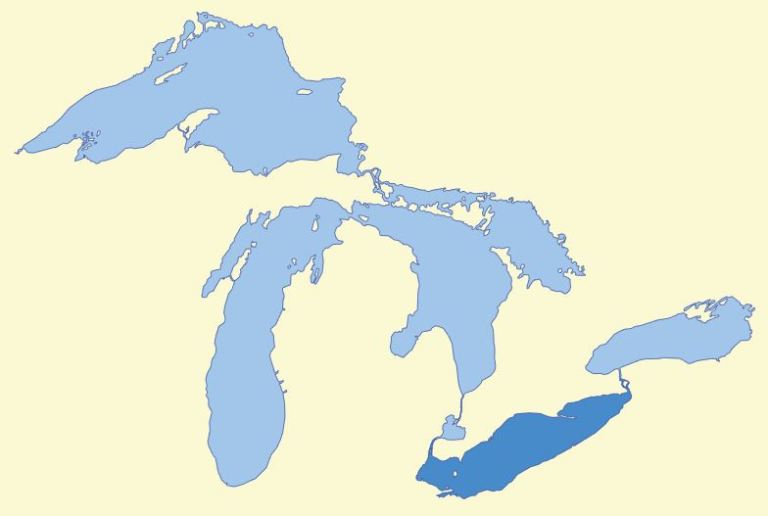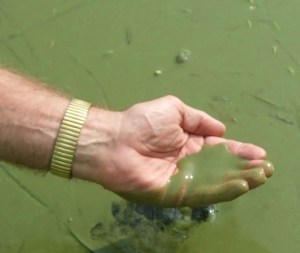One thing that I see real essayists do when beginning a piece is start with a quote from someone famous. I guess that’s what you’re supposed to do when you can’t think of soaring words on your own. It occurred to me that I might want to try this. Thus:
“I grasp the hands of those next to me, and take my place in the ring to suffer and to work, taught by an instinct, that so shall the dumb abyss be vocal with speech.”—Emerson
Just so you know that I am consciously trying to be unpretentious here, that is literally the only thing of Emerson’s that I am certain that I’ve read. But, I like it, and so here we are. Sometimes I think we’re lucky that people like Emerson didn’t have Twitter and whatever else because they might have gotten satisfied (and lazy) just tossing out tiny gems like the one above, and many of the great works might never have been written.
Speaking of Twitter, a few weeks ago I saw a post from an Iowa farmer commenting on the recently-passed (2/27/19) Lake Erie Bill of Rights which garnered an IWiLL-like 61% of the vote. The measure would allow Ohio residents to sue on behalf of Lake Erie, which if you don’t know, suffers from nutrient-driven harmful algae blooms. This particular farmer commented that this was an example of why farmers needed to engage with farm policy and commodity organizations, because, “the threat was real”. I found the choice of words here interesting, especially “threat”. Someone unknowledgeable about water quality issues relating to agriculture might wonder just what “threat” could be posed by people wanting clean water. Although this farmer didn’t really want to say, I don’t think I am going out on a limb by saying that what is threatened is agriculture’s license to release unregulated amounts of nutrients beyond the farm field and into the surrounding environment, and the ability to farm in ways that result in that outcome.

This comes on the heels of former Ohio governor John Kasich’s late-term attempt to institute protections for Lake Erie by declaring through executive order eight watersheds that flow into the lake as distressed. The Ohio Soil and Water Conservation Commission, the farm lobby, and state legislators squashed that idea and blocked it. For many, there was something therapeutic about Kasich’s efforts, even if it was done without much risk (Kasich was a lame duck). Finally, a politician that seemed serious and fed up about the pace of progress on nutrient pollution.
The new Ohio governor, Mike DeWine, recently proposed a $900 million “protection fund” that would focus on Lake Erie and other Ohio waters, and would use at least part of it to “focus on farm runoff and sediment from bleeding into waterways”. (For the record, Kasich proposed spending $3 billion.) “Land management and wetlands creation would also be a target”, DeWine said. “There also has to be incentives that are built in to help farmers so they don’t bear the entire burden of doing this,” he said to reporters. “I would make sure they are farming in a manner which does not cause as much of the nutrients to flow into the lake as are currently happening.” (Emerson, he’s not.)
Make no mistake, Kasich’s executive order was a “threat”. DeWine’s approach here is very much “old school”, that is, providing public dollars as cost share to farmers in an effort to entice them into adopting practices that will reduce nutrient runoff, without compulsory measures that agriculture sees as regulation. This is pretty much the history (with a few exceptions) of how this country has dealt with nutrient pollution. There have been some limited successes with phosphorus pollution, but this strategy has been ineffective in reducing nitrogen pollution, and you can read why in some of my earlier blog posts.

Meanwhile back in Iowa, very few farmers I talk to or read about are getting the economic outcomes that they want and feel they deserve. Compared to the capital investment required to farm in the US Midwest, there is good reason for them to feel this way. A thousand acres of land in Iowa (probably close to the minimum needed to operate profitably) is worth $10 million or more. Equipment, buildings, and the rest, probably another couple million at least. To plant a crop on that land probably requires upwards of $400,000 in seed, chemicals, fertilizer, insurance, etc. Maybe more. If the farmer makes $100/acre at harvest, that’s $100,000. Not a bad income, but certainly not what one might expect with a $12 million investment. And we know with a certainty that the $100k would be less without government assistance and immunity from regulation and many forms of taxation.
At the same time, many (most?) Americans are not getting the environmental outcomes, like good water quality, that they want from our food production system. So farmers aren’t getting the economic outcomes they want, and the public isn’t getting the environmental outcomes that we want. At the same time, the taxpayer indemnifies the system with publicly-supported crop insurance, usually unknowingly. So this begs the question, who is getting the outcomes that they want from our policies, and in particular, the old school policies targeting improved water quality?
I think the answer to my question is those who benefit from cheap commodities and maximum agricultural land use, what I call Max Acres*. If we were to design a system that would produce a huge abundance of anything without bankrupting the producers, how would we do it? Well, of course, we would incentivize the activity with government policy and subsidies while not putting any controls on supply (the current situation in the US with corn and soybean production). This virtually guarantees overproduction. Therefore, farm subsidies like crop insurance are in effect a subsidy for the commodity buyers and those whose livelihood is connected to them and Max Acres, and this goes far beyond just agribusiness. You could even make the case that I am one of them.
In the current scenario, the farmer is continuously encouraged to produce more bushels, and increased production without a concomitant increase in demand drives the per bushel price down. In this situation, the only way for the grain farmer to increase his income is to produce more bushels, and the spiral continues. Excessive pollution, especially nutrient pollution (more bushels, after all), is a predictable outcome in this scenario, especially when government policy is designed to keep nutrient prices low.
Now the taxpayer, after already having been asked to indemnify this system, is told that the only way to reduce the resultant pollution is to contribute more public funds so farmers aren’t financially burdened in their efforts to improve water quality. Advocates of this approach exist on both ends of the political spectrum and rationalize it with the idea that the public benefits from the farmers’ private actions, and thus we should have skin in the game. In my view, water quality is taken hostage by this old school policy, while at the same time, we do little to address the underlying methods and economics of crop production that drive the pollution problem in the first place. And the beneficiaries of low commodity prices and Max Acres are relieved of any responsibility for degraded water quality.
I’m doing more pontificating here than I should, so I need to finish up and to do that I will talk about another famous writer, Wendell Berry. Wendell is not my favorite writer. I find his essays to be lots and lots of long words and sentences, with gems buried within, but the gems are truly precious. Anyway, he has talked about how each generation finds contempt and disgust with previous generations (think slavery), and we are crazy if we think our generation will be immune from this. One thing I believe future generations of Iowans will think about is this: that we knew our water was degraded, we knew what caused the degradation, we had ideas on how to fix it, but we didn’t fix it. And the reason we didn’t fix it is because we lacked the courage to confront the forces that kept us locked into a status quo preferred by only a few.
So there is today’s effort to fill the dumb abyss with some words.
*If there is a company or a person out there called Max Acres, my apologies. I googled it, and I didn’t find anything.